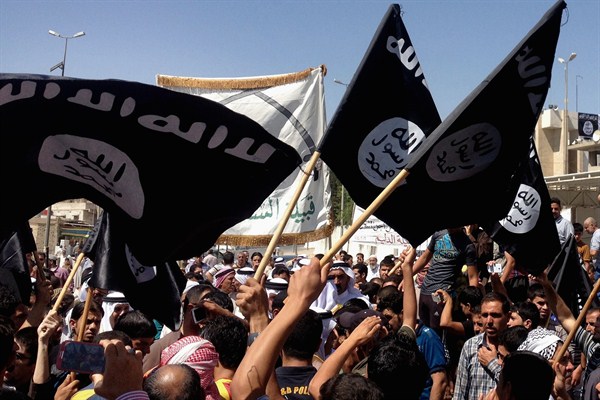The rise of the self-proclaimed Islamic State (IS) has further destabilized a region already in upheaval and dominated U.S. security policy in the Middle East. On Tuesday, Turkey and the U.S. came to a landmark agreement to establish an “Islamic State-free zone” on the Turkish-Syrian border, marking a potential turning point in the multinational effort to fight IS. This report covers the group’s ideology and strategy, its impact on and implications for the Middle East, and the U.S. strategy to combat its spread.
All of the articles linked below are free for non-subscribers until Aug. 13.
The Islamic State’s Ideology and Strategy:
The Islamic State’s rapid spread, effective foreign-recruitment strategy and brutal tactics have complicated multinational efforts to halt its movement.
Understanding the Enemy: Inside the Mind of the Islamic State
“To defeat a wily enemy, one must first get inside its head,” wrote Steven Metz last November, as U.S. military planners convened to plot their approach against the Islamic State. Effective strategy, he argued, requires considering the group’s use of barbarity, the rate of its expansion and how it might respond if confronted with a coalition-launched offensive.
In May, Tyler Golson unpacked IS’ communications strategy that simultaneously targets its Western and Arab constituencies. The group’s “frighteningly good works of propaganda,” he explained, balance its “spectacular savagery and zealous apocalyptic ideology” directed toward Western audiences with the “softer side” of its local dispatches designed to promote its ability to govern territory it has seized.
Following IS’ late-February rampage through the Mosul Museum, Frederick Deknatel explained the group’s deliberate destruction of cultural and religious artifacts in Iraq and Syria. “But whatever IS isn’t destroying, it’s selling,” he added, as revenues from looted antiques have become a major source of its funding, second only to oil.
In February, Frida Ghitis showed how IS’ execution of 21 Egyptian Coptic Christians captured in Libya, broadcast in a harrowing video, reflects its strategy to “exploit divisions within the countries and societies it seeks to conquer and intimidate.” Ghitis explains that a “calculated policy of targeting representatives” of religious and ethnic minorities has been a tactical boon for the group in a region already marred by sectarian divisions.
Regional Impact:
As IS conquers swaths of territory, the group has further destabilized a region already plagued by sectarian violence, internal displacement and political unrest.
In March, Myriam Benraad noted that “Iraq’s Sunnis remain ground zero” in the fight against IS, and argued that a sustainable defeat of the group “must include a political component addressing Sunni grievances in Iraq.” Sunnis across the region, she argues, must “arrive at a coherent strategy,” and Iraq must integrate them into the “institutions from which they have been excluded for a decade.”
Israel has remained “relatively aloof” in the coalition fight against IS, wrote Brent E. Sasley last October. But the group does pose an indirect threat to Israel: Jihadis could traverse Israel’s borders through neighboring Jordan, “forcing Israel to change its course.” This would in turn raise questions in Israel “about its longstanding commitment to Jordan’s territorial integrity and security.”
Last September, Hannes Cerny called concerns that U.S. support to Iraqi Kurds could facilitate their secession “ill-founded.” Prospects of a unilateral push for independence have “receded,” he wrote, “precisely because Iraqi Kurds have been prominently integrated into the international coalition to defeat the Islamic State.”
U.S. Policy and Strategy:
Washington has struggled to reckon with an extremist entity distinct from terrorist groups of the past, as well as to navigate a battlefield characterized by shifting affiliations and complex local alliances.
The United States Is Not at War With the Islamic State
Those who criticize U.S. President Barack Obama’s strategy against IS as mere containment should revisit “the recent history of U.S. security policy,” wrote Steven Metz in June, arguing that “The U.S. is not ‘at war’ with IS—it is involved in a multidimensional conflict with the broader phenomenon of transnational jihad,” which, though “deadly important,” requires an approach distinct from war.
Just after a September blast killed the entire leadership of Ahrar al-Sham, one of Syria’s strongest rebel groups, Frederick Deknatel wrote that Washington has “shown little policy interest” in the evolution of Islamist rebel groups. “It has focused instead on [IS] and Jabhat al-Nusra, rather than pursuing a potential opportunity” to coordinate with states that support non-jihadi Islamist groups and make “its Syria policy more broadly reflect battlefield realities.”
Reporting from Irbil last September, Balint Szlanko argued that the Kurdistan Regional Government (KRG)—an important U.S. ally in the fight against IS—“has its own strategic agenda.” Szlanko argued that the KRG’s “democratic facade” masks “thuggish politics” that could fuel their drive for independence, stoking ethnic tension in the contested city of Kirkuk.
Related

